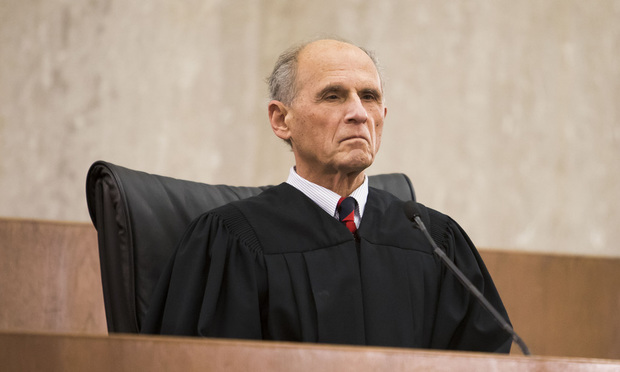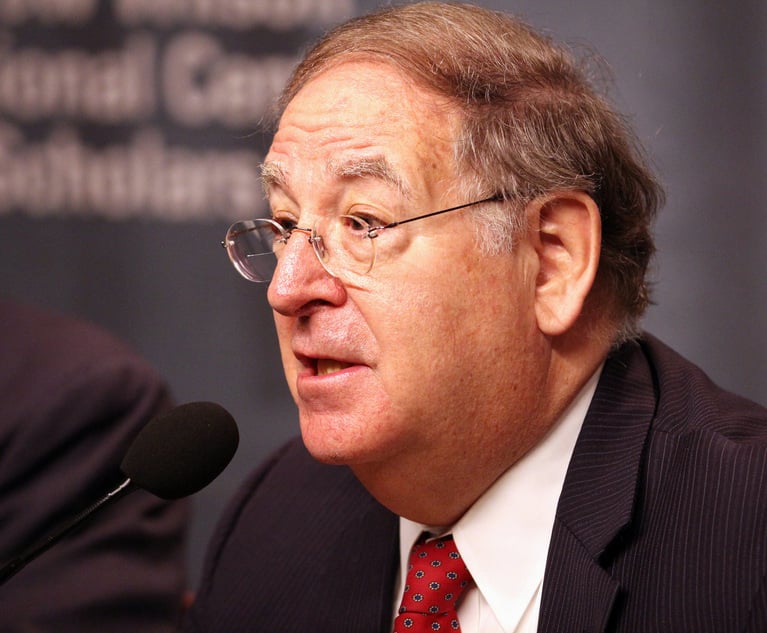Federal Government Could Face 'Uphill Battle' in Appeal of OPM Data Breach Dismissals
A federal appeals panel appeared poised to overturn dismissal of two data breach cases against the U.S. Office of Personnel Management based on standing.
November 05, 2018 at 04:14 PM
5 minute read
 Judge David Tatel, of the U.S. District Court for the District of Columbia/Photo by Diego M. Radzinschi/ALM
Judge David Tatel, of the U.S. District Court for the District of Columbia/Photo by Diego M. Radzinschi/ALM
A federal appeals panel appeared poised to overturn the dismissal of a closely watched pair of cases brought over data breaches that hit the U.S. Office of Personnel Management.
The breaches compromised the Social Security numbers and other personal information of 21 million federal government employees, and prospective employees, at OPM. In 2017, U.S. District Judge Amy Berman Jackson dismissed two cases brought over the breaches, one by a government employee union and one a class action, after concluding that the plaintiffs lacked standing to sue because they hadn't been injured.
But, on Friday, a three-judge panel of the U.S. Court of Appeals for the D.C. Circuit wasn't so convinced.
“You've got an uphill battle,” Circuit Judge David Tatel told Assistant U.S. Attorney Sonia Carson in oral arguments. The other panelists, Patricia Millett and Stephen Williams, also appeared skeptical about the government's arguments.
“I think it's fair to say that the judges, all three of them, pressed the government quite hard on the standing issue,” said Paras Shah, assistant counsel at the National Treasury Employees Union, who argued on Friday in the union case.
The panel asked numerous questions, for example, about one of the lead plaintiffs in the class action who spent money out of her own pocket to purchase credit-monitoring services before OPM began offering free similar services to breach victims. Panelists also pushed back against Carson's argument that the risk of identity theft was speculative in a case involving hacked Social Security numbers.
Pete Patterson, a partner at Cooper & Kirk, who argued for the plaintiffs in the class action, did not respond to a request for comment.
U.S. Department of Justice spokeswoman Kelly Laco declined to comment.
The case raises a controversial issue in data breach class actions: Whether plaintiffs whose information was hacked suffered injuries sufficient to sue in federal court under Article III of the U.S. Constitution. In many cases, victims of data breaches allege nothing more than the risk of identity theft, but some cases have named plaintiffs who suffered fraudulent tax returns, charges to their credit cards or other costs. Courts have split over whether those injuries are sufficient to have standing.
In an amicus brief in the OPM appeal, the Electronic Privacy Information Center, joined by 44 “legal scholars and technical experts,” outlined the damage that stolen Social Security numbers can do. “The threats to the security of personal data collected by the government increase daily, and the law has failed to keep up,” the brief states.
The U.S. Chamber of Commerce, many of its members having been sued over data breaches, urged the D.C. Circuit in its own amicus brief not to take a “one-size-fits-all presumption on standing” given that some hackers do not intend to use the personal information.
The two OPM breaches compromised names, birth dates, addresses and Social Security numbers. In one case, the American Federation of Government Employees, along with 38 individuals, brought a class action under the federal Privacy Act, while the National Treasury Employees Union and three government employees who had filled out background investigation forms filed a case alleging OPM violated their constitutional right to privacy of information.
Complicating matters was a recent decision by the D.C. Circuit reversing dismissal of a case related to a 2014 breach at health insurer CareFirst. In that case, the panel found that the district judge had taken too narrow a view of harm to the plaintiffs in finding that the increased risk of identity theft was speculative.
Jackson wrote that, because of CareFirst, “standing is a very close and difficult question in this case.” But, ultimately, she found the cases to be different because CareFirst dealt with a domestic hack in which credit card or bank fraud was at issue, while OPM's breach appeared to be from a foreign state and involved Social Security numbers.
The plaintiffs both appealed to reverse Jackson's opinion, citing the CareFirst decision and other circuit court precedents that allowed data breach cases to go forward.
The panel appeared receptive to their arguments on standing.
“The government, in its briefs and arguments, tried its best to distinguish Attias, and I think on Friday what we saw was some pushback from the court on that,” Paras said.
Jackson, the district judge, also had found that immunity shielded the federal government and contractor KeyPoint Government Solutions from the class claims. But the panel questioned KeyPoint attorney Jason Mendro, a Washington, D.C., partner at Gibson, Dunn & Crutcher, on whether the contractor's immunity would stand if it found the government was liable.
Mendro did not respond to a request for comment.
The D.C. Circuit scheduled oral arguments for this month after three of the lawyers had scheduling conflicts, two of them for family purposes. Carson wrote a letter stating she expected to begin maternity leave on Jan. 1, and Patterson said he would be on paternity leave in early 2019.
This content has been archived. It is available through our partners, LexisNexis® and Bloomberg Law.
To view this content, please continue to their sites.
Not a Lexis Subscriber?
Subscribe Now
Not a Bloomberg Law Subscriber?
Subscribe Now
NOT FOR REPRINT
© 2025 ALM Global, LLC, All Rights Reserved. Request academic re-use from www.copyright.com. All other uses, submit a request to [email protected]. For more information visit Asset & Logo Licensing.
You Might Like
View All
Quinn Emanuel Files Countersuit Against DOJ in Row Over Premerger Reporting
3 minute read
'Thoughtful Jurist': Maryland US District Senior Judge Messitte Dies After Short Illness
4 minute read
'Religious Discrimination'?: 4th Circuit Revives Challenge to Employer Vaccine Mandate
2 minute read
4th Circuit Revives Racial Harassment Lawsuit Against North Carolina School District
3 minute readTrending Stories
- 1'A Death Sentence for TikTok'?: Litigators and Experts Weigh Impact of Potential Ban on Creators and Data Privacy
- 2Bribery Case Against Former Lt. Gov. Brian Benjamin Is Dropped
- 3‘Extremely Disturbing’: AI Firms Face Class Action by ‘Taskers’ Exposed to Traumatic Content
- 4State Appeals Court Revives BraunHagey Lawsuit Alleging $4.2M Unlawful Wire to China
- 5Invoking Trump, AG Bonta Reminds Lawyers of Duties to Noncitizens in Plea Dealing
Who Got The Work
J. Brugh Lower of Gibbons has entered an appearance for industrial equipment supplier Devco Corporation in a pending trademark infringement lawsuit. The suit, accusing the defendant of selling knock-off Graco products, was filed Dec. 18 in New Jersey District Court by Rivkin Radler on behalf of Graco Inc. and Graco Minnesota. The case, assigned to U.S. District Judge Zahid N. Quraishi, is 3:24-cv-11294, Graco Inc. et al v. Devco Corporation.
Who Got The Work
Rebecca Maller-Stein and Kent A. Yalowitz of Arnold & Porter Kaye Scholer have entered their appearances for Hanaco Venture Capital and its executives, Lior Prosor and David Frankel, in a pending securities lawsuit. The action, filed on Dec. 24 in New York Southern District Court by Zell, Aron & Co. on behalf of Goldeneye Advisors, accuses the defendants of negligently and fraudulently managing the plaintiff's $1 million investment. The case, assigned to U.S. District Judge Vernon S. Broderick, is 1:24-cv-09918, Goldeneye Advisors, LLC v. Hanaco Venture Capital, Ltd. et al.
Who Got The Work
Attorneys from A&O Shearman has stepped in as defense counsel for Toronto-Dominion Bank and other defendants in a pending securities class action. The suit, filed Dec. 11 in New York Southern District Court by Bleichmar Fonti & Auld, accuses the defendants of concealing the bank's 'pervasive' deficiencies in regards to its compliance with the Bank Secrecy Act and the quality of its anti-money laundering controls. The case, assigned to U.S. District Judge Arun Subramanian, is 1:24-cv-09445, Gonzalez v. The Toronto-Dominion Bank et al.
Who Got The Work
Crown Castle International, a Pennsylvania company providing shared communications infrastructure, has turned to Luke D. Wolf of Gordon Rees Scully Mansukhani to fend off a pending breach-of-contract lawsuit. The court action, filed Nov. 25 in Michigan Eastern District Court by Hooper Hathaway PC on behalf of The Town Residences LLC, accuses Crown Castle of failing to transfer approximately $30,000 in utility payments from T-Mobile in breach of a roof-top lease and assignment agreement. The case, assigned to U.S. District Judge Susan K. Declercq, is 2:24-cv-13131, The Town Residences LLC v. T-Mobile US, Inc. et al.
Who Got The Work
Wilfred P. Coronato and Daniel M. Schwartz of McCarter & English have stepped in as defense counsel to Electrolux Home Products Inc. in a pending product liability lawsuit. The court action, filed Nov. 26 in New York Eastern District Court by Poulos Lopiccolo PC and Nagel Rice LLP on behalf of David Stern, alleges that the defendant's refrigerators’ drawers and shelving repeatedly break and fall apart within months after purchase. The case, assigned to U.S. District Judge Joan M. Azrack, is 2:24-cv-08204, Stern v. Electrolux Home Products, Inc.
Featured Firms
Law Offices of Gary Martin Hays & Associates, P.C.
(470) 294-1674
Law Offices of Mark E. Salomone
(857) 444-6468
Smith & Hassler
(713) 739-1250










